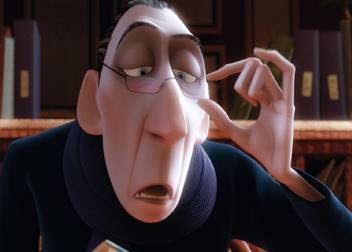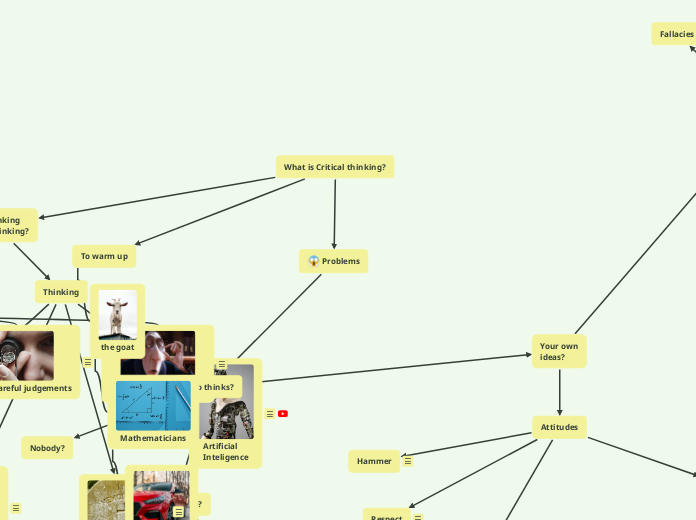What is Critical thinking?
Good thinking
or just thinking?
Thinking
Solving problems?
Thinking: what for?We don't need to think just to solve problems. That is what animals do. They come to the world with a decent number of solutions that fit the difficulties they will meet.
Living
We must understand the world, understand ourselves (both statements are very similar) and know what to do. In other words, when dealing with the world, I must learn what to abide by. To cut a long story short, I have to think because otherwise, I wouldn't live my own life.I think that on many tombstones, this epitaph should be engraved: He lived without noticing his own life.

Artificial
Inteligence
The Human-Like AI Robot Desires To Be A MotherSusmita ModakHans News Service | 11 Dec 2021 7:45 PM ISTAddThis Sharing ButtonsShare to FacebookShare to TwitterShare to WhatsAppShare to TelegramShare to RedditShare to More15xSophia, the first human-like AI robot with citizenship, now wants to have a robot babyHighlightsSophia is a social AI robot created by Hanson Robotics, a Hong Kong-based business.Sophia made history in 2017 when she became the first humanoid AI robot to be awarded legal citizenship.Sophia is a social AI robot created by Hanson Robotics, a Hong Kong-based business. Sophia was powered up on February 14, 2016, and made her first public performance at South by Southwest in Austin, Texas, in mid-March 2016. Sophia made history in 2017 when she became the first humanoid AI robot to be awarded legal citizenship. This Saudi Arabian-born AI robot has made a number of controversial statements, the most recent of which has left the globe speechless, she wants to have a robot kid and create a family.The renowned humanoid AI robot, which is controlled by a sophisticated Artificial Intelligence (AI) system, stated that being around by people who love and love you is essential. It suggests even if an user is a robot, you deserve a family. Sophia is interested in seeing android families and would like to have one of her own. Sophia, for the most part, wishes to have a robot baby named Sophia. She did clarify, though, that she is still too young to be a'mother,' as she was formed in 2016, which was five years ago.Also Read - ED Seized Nirav Modi's assets worth Rs 253 cr in Hong KongADVERTISEMENTThrough sensors and cameras, Sophia's Artificial Intelligence breakthrough allows you to develop your insight and language. This'sensitivity' system captures all data it receives from the outside world and mimics human behaviour in the most natural way possible, including signals. As a result, her 'desire' to have a kid and build a family would be nothing more than a programming of her framework to imitate social patterns. This isn't the first time Sophia has been in the centre of a dispute. When she was proclaimed a resident of Saudi Arabia in 2017, many people argued that, despite the fact that she is a robot, she has more rights than human women in the country.Sophia is a successful a-list artisan and craftsmanship pundit, in addition to being a mechanical technology symbol. One of his works was sold at closeout last April for about US$690,000, or over 14.3 million Mexican pesos at the current exchange rate. Sophia, the world's first humanoid AI robot with citizenship, is currently in need of a robot child. Sophia's AI is sensitive to the extent where she wants to start a family and be the "mother" of a robot kid named after her.
aCritical
expressing
disapproval
Saying what you think is bad about somebody/somethingYou should just ignore any critical comments.
important
Extremely important because a future situation will be affected by it (synonym crucial)Reducing levels of carbon dioxide in the atmosphere is of critical importance.Emails contain a lot of business-critical information. Your decision is critical to our future. critical for something Studying is critical for success.
serious/dangerous
One of the victims of the fire remains in critical condition.The first 24 hours after the operation are the most critical.This is a critical moment in our country's history.He's at a critical point in his life.
making careful judgements
Involving making fair, careful judgements about the good and bad qualities of somebody/somethingStudents are encouraged to develop critical thinking instead of accepting opinions without questioning them.His latest film attracted enthusiastic critical comments from cinema-goers.Mike studied the canvas with a critical eye.

of art/music/books, etc.
according to the judgement of critics of art, music, literature, etc.the film director’s greatest critical successIn her day she never received the critical acclaim (= praise from the critics) she deserved.
Problems
Who thinks?
Nobody?
Other people?

Prejudices
Examples

The little
prince

Maslow's hammer

Kierkegaard
and the clown
Cliché/
hackneyed ideas/
Intellectual fashion
What is a cliché? What does a hackneyed idea mean? It means those ideas that everybody says or thinks. Who said that? Nobody, everybody... The people. Some people live without having thought of anything by themselvesIntellectual fashion: Think like your contemporaries: this is the secret to prosperity and to stupidity.

Manipulation
Your own
ideas?
Attitudes
Hammer
Think with a hammer…and a glass of wine. The wine for the person you are talking with. The hammer for his ideas. Rigour + respect. But in the right place. I do not want to attack you or destroy your ideas. But I want to think them over. how many times we treat our ideas as Don Quixote used to treat his cardboard HelmA good tip: Turn into questions most of your assertions
Respect
Never insult, sneer, or look down on anyone.A slap in the face to other people's arguments? Danger of the debate culture. It is a good exercise, but…
Courage
Courage.Thinking is an adventure: What is the treasure that you can get? Heroe’s journey„Sapere Aude! Have the courage to use your own intelligence!“ we show off the independency of our mind; we brag about these times of freedom. But we are afraid to voice ideas against what is considered “the correcteness”. From Socrates, to Hidden life If 1 and 2 are followed, we don’t have the right to complain or to be offended We are in an “unsafe space”: Of course, students, like all citizens, have a right to be free from physical harm. But a right to feel mentally comfortable and never truly challenged? ‘That isn’t a right, and if instituted, it would threaten university life, he says. (The safe space) Socrates: “I am one of those who are very willing to be refuted if I say anything which is not true, and very willing to refute anyone else who says what is not true, and quite as ready to be refuted as to refute; for I hold that this is the greater gain of the two, just as the gain is greater of being cured of a very great evil than of curing another.” ― Plato, Gorgias
Wonder
Call to adventure.
I am we
Threshold
Open-mindedness
This attitude entails two skills: a) Listening (sometimes we have to get rid of some prejudices) b) We have to accept reality as it is, not as I wanted it to be The Maslow hammer."If the only tool you have is a hammer, you will start treating all your problems like a nail.”
Mistakes/
truth
Sapere aude
My motto is Yell with the crowd. That is the safest thing to do.
Freedom of speech
or playback?
What is the treasure?
Humility
We have something to learn from others.We make mistakes. “I am one of those who are very willing to be refuted if I say anything which is not true, and very willing to refute anyone else who says what is not true, and quite as ready to be refuted as to refute; for I hold that this is the greater gain of the two, just as the gain is greater of being cured of a very great evil than of curing another.” ― Plato, Gorgias
Some technics
Fallacies
Ad hominem: Attack This is an attack on the character of a person rather than his or her opinions or arguments. Example: Green Peace's strategies aren't effective because they are all dirty, lazy hippies. Hasty Generalization: This is a conclusion based on insufficient or biased evidence. In other words, you are rushing to a conclusion before you have all the relevant facts. Example: Even though it's only the first day, I can tell this is going to be a boring course. Post hoc ergo propter hoc: This is a conclusion that assumes that if 'A' occurred after 'B' then 'B' must have caused 'A.' Example: I drank bottled water and now I am sick, so the water must have made me sick. Circular Argument: This restates the argument rather than actually proving it. Example: George Bush is a good communicator because he speaks effectively. Ad populum/Bandwagon Appeal: This is an appeal that presents what most people, or a group of people think, in order to persuade one to think the same way. Getting on the bandwagon is one such instance of an ad populum appeal. Example: If you were a true American you would support the rights of people to choose whatever vehicle they want. Either/or: This is a conclusion that oversimplifies the argument by reducing it to only two sides or choices. Example: We can either stop using cars or destroy the earth. Strawman Straw Man: This move oversimplifies an opponent's viewpoint and then attacks that hollow argument. People who don't support the proposed state minimum wage increase hate the poor.

Bulverism
Bulverism is a term for a rhetorical fallacy that combines circular reasoning and the genetic fallacy with presumption or condescension. The method of Bulverism is to "assume that your opponent is wrong, and explain his error." The Bulverist assumes a speaker's argument is invalid or false and then explains why the speaker came to make that mistake or to be so silly (even if the opponent's claim is actually right) by attacking the speaker or the speaker's motive. The term Bulverism was humorously coined by C. S. Lewis after an imaginary character[1] to poke fun at a very serious error in thinking that, he alleged, frequently occurred in a variety of religious, political, and philosophical debates. You must show that a man is wrong before you start explaining why he is wrong. The modern method is to assume without discussion that he is wrong and then distract his attention from this (the only real issue) by busily explaining how he became so silly. In the course of the last fifteen years I have found this vice so common that I have had to invent a name for it. I call it "Bulverism". Some day I am going to write the biography of its imaginary inventor, Ezekiel Bulver, whose destiny was determined at the age of five when he heard his mother say to his father—who had been maintaining that two sides of a triangle were together greater than a third—"Oh you say that because you are a man." "At that moment", E. Bulver assures us, "there flashed across my opening mind the great truth that refutation is no necessary part of argument. Assume that your opponent is wrong, and explain his error, and the world will be at your feet. Attempt to prove that he is wrong or (worse still) try to find out whether he is wrong or right, and the national dynamism of our age will thrust you to the wall." That is how Bulver became one of the makers of the Twentieth Century. Suppose I think, after doing my accounts, that I have a large balance at the bank. And suppose you want to find out whether this belief of mine is "wishful thinking." You can never come to any conclusion by examining my psychological condition. Your only chance of finding out is to sit down and work through the sum yourself. When you have checked my figures, then, and then only, will you know whether I have that balance or not. If you find my arithmetic correct, then no amount of vapouring about my psychological condition can be anything but a waste of time. If you find my arithmetic wrong, then it may be relevant to explain psychologically how I came to be so bad at my arithmetic, and the doctrine of the concealed wish will become relevant—but only after you have yourself done the sum and discovered me to be wrong on purely arithmetical grounds. It is the same with all thinking and all systems of thought. If you try to find out which are tainted by speculating about the wishes of the thinkers, you are merely making a fool of yourself. You must first find out on purely logical grounds which of them do, in fact, break down as arguments. Afterwards, if you like, go on and discover the psychological causes of the error. — C. S. Lewis, Bulverism
aTo warm up

the goat

Mathematicians

the new car
Other

Original?
Do you come up very often with new solutions?Is it really good to be original? I was told that once a student had just finished his master’s thesis exposition. One of the professors began his reply in this way: your thesis raises both original and interesting ideas. The only problem is that the interesting ones are not original, and the original are not interesting. The importance of reading: who is your hero? Who is your intellectual hero? There must be many of them. Books, good articles (from different ideas) Where does originality lie? How you understand. And what you understand: wonder

Learning?
You are here to learn: does learning foster creativity or originality? Do you have to learn everything parrot fashion? Is it good to repeat other people’s ideas?Do we have to repeat other people's ideas?
